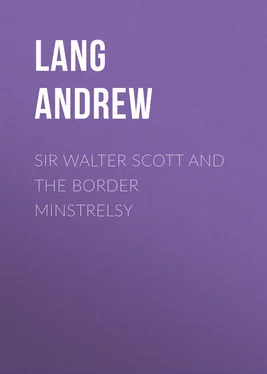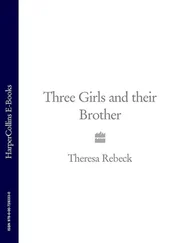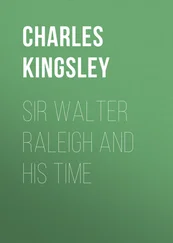Remember Fiery of the Scot
Hath cowr’d aneath thy hand ;
For ilka drap o’ Maitlen’s blood
I’ll gie thee rigs o’ land. —
The two last lines only are original ; you will easily perceive that they occur in the very place where we suspected a want . I am surprised to hear that this song is suspected by some to be a modern forgery ; this will be best proved by most of the old people hereabouts having a great part of it by heart ; many, indeed, are not aware of the manners of this place, it is but lately emerged from barbarity, and till this present age the poor illiterate people in these glens knew of no other entertainment in the long winter nights than in repeating and listening to these feats of their ancestors, which I believe to be handed down inviolate from father to son, for many generations, although no doubt, had a copy been taken of them at the end of every fifty years, there must have been some difference, which the repeaters would have insensibly fallen into merely by the change of terms in that period. I believe that it is thus that many very ancient songs have been modernised, which yet to a connoisseur will bear visible marks of antiquity. The Maitlen, for instance, exclusive of its mode of description, is all composed of words, which would mostly every one spell and pronounce in the very same dialect that was spoken some centuries ago.
Pardon, my dear Sir, the freedom I have taken in addressing you – it is my nature; and I could not resist the impulse of writing to you any longer. Let me hear from you as soon as this comes to your hand, and tell me when you will be in Ettrick Forest, and suffer me to subscribe myself, Sir, your most humble and affectionate servant,
James Hogg.
In Scott’s printed text of the ballad, two interpolations, of two lines each, are acknowledged in notes. They occur in stanzas vii., xlvi., and are attributed to Hogg. In fact, Hogg sent one of them (vii.) to Laidlaw in his manuscript. The other he sent to Scott on 30th June 1802.
Colonel Elliot, in the spirit of the Higher Criticism ( chimæra bombinans in vacuo ), writes, 21 21 Further Essays , pp. 225, 226.
“Few will doubt that the footnotes” (on these interpolations) “were inserted with the purpose of leading the public to think that Hogg made no other interpolations; but I am afraid I must go further than this and say that, since they were inserted on the editor’s responsibility, the intention must have been to make it appear as if no other interpolations by any other hand had been inserted.”
But no other interpolations by another hand were inserted! Some verbal emendations were made by Scott, but he never put in a stanza or two lines of his own.
Colonel Elliot provides us with six pages of the Higher Criticism. He knows how to distinguish between verses by Hogg, and verses by Scott! 22 22 Further Essays , pp. 227–234.
But, save when Scott puts one line, a ballad formula, where Hogg has another line, Scott makes no interpolations, and the ballad formula he probably took, with other things of no more importance, from Mrs. Hogg’s recitation. Oh, Higher Criticism!
I now print the ballad as Hogg sent it to Laidlaw, between August 1801 and March 1802, in all probability.
[Back of Hogg’s MS.: Mr. William Laidlaw, Blackhouse.]
OLD MAITLAND
A VERY ANTIENT SONG
There lived a king in southern land
King Edward hecht his name
Unwordily he wore the crown
Till fifty years was gane.
He had a sister’s son o’s ain
Was large o’ blood and bane
And afterwards when he came up,
Young Edward hecht his name.
One day he came before the king,
And kneeld low on his knee
A boon a boon my good uncle,
I crave to ask of thee
“At our lang wars i’ fair Scotland
I lang hae lang’d to be
If fifteen hunder wale wight men
You’ll grant to ride wi’ me.”
“Thou sal hae thae thou sal hae mae
I say it sickerly;
Конец ознакомительного фрагмента.
Текст предоставлен ООО «ЛитРес».
Прочитайте эту книгу целиком, купив полную легальную версию на ЛитРес.
Безопасно оплатить книгу можно банковской картой Visa, MasterCard, Maestro, со счета мобильного телефона, с платежного терминала, в салоне МТС или Связной, через PayPal, WebMoney, Яндекс.Деньги, QIWI Кошелек, бонусными картами или другим удобным Вам способом.
Child, part vi. p. 513.
Child, part x. p. 294.
Hogg to Scott, 30th June 1802, given later in full.
See De Origine , Moribus , et Rebus Gestis Scotorum , p. 60 (1578).
Lockhart, vol. ii. p. 60 (1839).
Lockhart, vol. ii. pp. 130–135 (1839).
Minstrelsy , iii. 186–198.
Child, part ix., 187.
Further Essays , p. 184.
Child, vol. i. p. xxx.
Minstrelsy , 2nd edition, vol iii. (1803).
Further Essays , pp. 247, 248.
Carruthers, “Abbotsford Notanda,” in R. Chambers’s Life of Scott , pp. 115–117 (1891).
Ibid. , p. 118.
Carruthers, “Abbotsford Notanda,” in R. Chambers’s Life of Scott , pp. 115–117 (1891).
Lockhart, vol. ii. p. 99.
Lockhart, Life of Sir Walter Scott , Bart. , vol. ii. pp. 99, 100 (1829).
Ritson of 10th April 1802, in his Letters of Joseph Ritson , Esq. , vol. ii. p. 218. Letter of 10th June 1802, Ibid. , p. 207. Ritson returned the original manuscript of Auld Maitland on 28th February 1803, Ibid. , p. 230.
Carruthers, pp. 128, 131.
Sweet William’s Ghost .
Further Essays , pp. 225, 226.
Further Essays , pp. 227–234.









